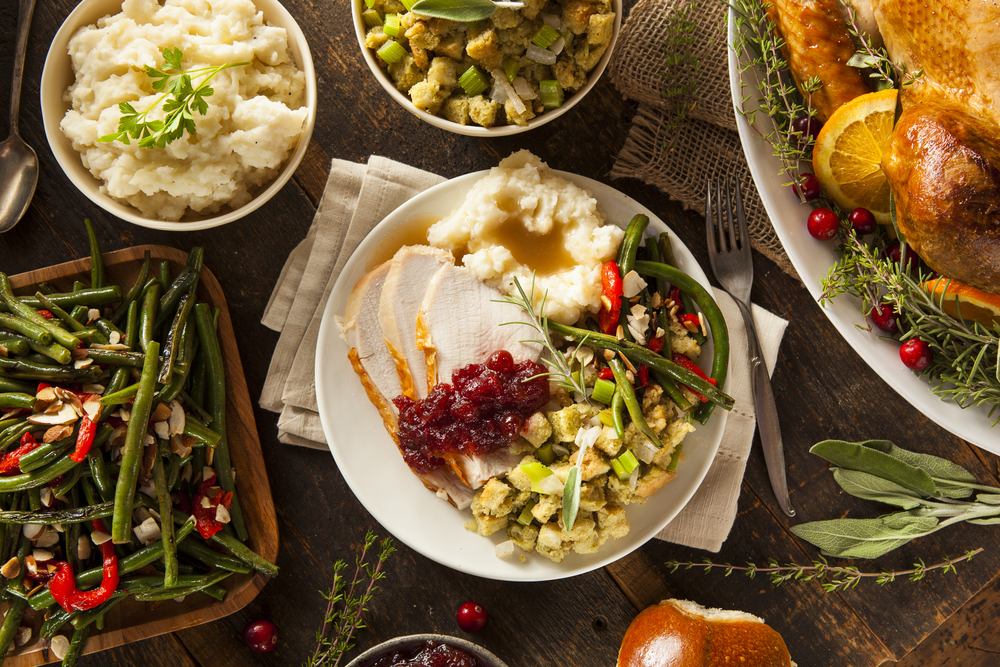 As Thanksgiving swiftly approaches, we gather recipes, make our menu, write our grocery list, and pack our pantry to the gill with all of the delicious fixin’s for the big day — sourdough stuffing, green bean casserole (complete with those crunchy onions!), sweet potatoes, an abundance of pies, the list goes on. But what’s not so drool-worthy? Considering all of the calories that go along with this massive meal.
As Thanksgiving swiftly approaches, we gather recipes, make our menu, write our grocery list, and pack our pantry to the gill with all of the delicious fixin’s for the big day — sourdough stuffing, green bean casserole (complete with those crunchy onions!), sweet potatoes, an abundance of pies, the list goes on. But what’s not so drool-worthy? Considering all of the calories that go along with this massive meal.
Food for thought
According to Consumer Reports, Americans will eat anywhere from 3,000 to 4,500 calories during Thanksgiving dinner alone. Tristan Imhof, MD, a family medicine physician with Baptist Primary Care, notes that the number isn’t particularly shocking.
“As a physician, in particular one who sees and treats obesity on a daily basis, I wish this weren’t the case, but it’s not surprising to me,” he says. “It’s no secret that obesity continues to have a grasp on this nation and is responsible for a host of preventable diseases, from high blood pressure to heart disease to diabetes.”
Like the majority of us, Dr. Imhof admits that he does indulge annually at Thanksgiving dinner. However, mindfulness is key. He says it’s crucial to remain cognizant of the quantity and quality of food you eat in order to minimize the impact on your body. The issue isn’t just about consuming thousands of calories in one meal, Dr. Imhof says. The problem arises when overeating becomes a daily habit.
“It points to a larger problem of obesity as those who don’t exercise restraint at the Thanksgiving table may be unlikely to exercise restraint elsewhere,” Dr. Imhof said. “The problem starts when one sitting becomes five sittings, which becomes once a week and then becomes the norm.”
Health matters
Important to note is that the body isn’t designed to take in an abundance of high-calorie, high-fat foods in one sitting. Dr. Imhof warns that changes to the body can occur when someone overindulges in meals typical of something like Thanksgiving. In those with existing health issues — oftentimes caused by years of poor eating habits — a life-threatening condition could be triggered, such as a heart attack or stroke.
“It’s not uncommon after someone eats this type of meal that we see increases in blood pressure, edema or swelling, and high blood sugar, all of which, when left uncontrolled, can trigger a life-threatening event like a heart attack or stroke,” Dr. Imhof said.
Foods to watch out for
According to The Healthy, a wellness website from the publishers of Reader’s Digest, these holiday foods can wreak the most havoc on your health:
- Apple pie: With its delicious buttery crust and sugary filling, it’s no surprise that this dessert is a holiday favorite. According to The Healthy, a single slice of apple pie contains more calories than a plate of turkey breast with gravy, corn on the cob (butter included!), and a glass of red wine! If you plan to have a slice of pie and want to cut down the calories, make a few healthier swaps earlier in the meal, such as trading your stuffing for green beans.
- Stuffing: Speaking of stuffing — many dub this dish the non-negotiable of Thanksgiving side dishes. Why is it so irresistible? Well, it’s essentially just bread, butter, and sometimes sausage, making it pretty high in calories and fat. The good news (yes, there is some)? Baking your stuffing outside of the turkey can cut down on calories (and it’s safer). Plus, adding healthy vegetables like mushrooms, onions, and celery will give your fiber intake a boost.
- Mashed potatoes: The issue here isn’t actually the potatoes themselves (they have many important nutrients!) — it’s all the good stuff that gets mashed in with them, like whole milk or heavy cream, butter, and even cheese and bacon. To reduce calories and fat, simply use milk and a few spices like salt and pepper.
Chew on this
Trust us, we’re not saying you should completely empty the pantry or start a new tradition of “Thanksgiving salad.” All it means, Dr. Imhof shares, is to be mindful of what you’re eating, and most importantly, make sure it doesn’t become a regular pattern.
“It’s acceptable to enjoy some of the things you don’t typically have on a daily basis, but still do so in a responsible manner,” he says. “Pay attention to quantity and don’t eat to a point of discomfort. When your body gives you the signal that it’s time to stop, don’t continue to eat until you’re uncomfortable. Those body cues exist for a reason and should be acknowledged.”
A Baptist Primary Care physician can guide you to make better decisions for your overall health while providing routine tests and screenings to make sure you’re the healthiest version of yourself possible. To find the right physician for you, call 904.202.4YOU.
















